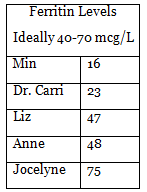There are many causes of fatigue, but this one often gets overlooked:
Low Iron.
Besides fatigue, other common symptoms of low iron include:
- poor concentration
- mood disturbances
- cold intolerance
- muscle weakness
- restless leg syndrome
- sore tongue
- weak immune system
- hair loss
This is a list of the iron (ferritin) levels from the fatigue patients featured in my book Reclaim Your Energy and Feel Normal Again:
 Two out of five patients had iron levels significantly below ideal.
Two out of five patients had iron levels significantly below ideal.
Min had the worst levels. Yet, despite her chronic fatigue, her doctor kept telling her all her blood tests were normal.
Your Iron Levels
Iron is measured with a ferritin blood test.
But, doctors don’t always test for ferritin.
As noted in the Ferritin Levels chart above, ideal levels of ferritin are 40-70 mcg/L.
Iron is interesting in that it can be too low or too high.
Both can cause fatigue.
Iron that is too low doesn’t always get found with an anemia test (a CBC test), so a good doctor will always check your ferritin separately.
How do you know if yours has been tested?
Ask for a copy of your blood work. You will see if you’ve been tested, and what your numbers are.
Treating for Iron
When iron is too low, you need to find the reason why and not just start supplementing with iron.
The most common reasons for low iron that medical doctors don’t routinely check for are:
- H. pylori infection in the stomach,
- Silent Celiac disease,
- Small intestinal bacterial overgrowth (SIBO), and
- Parasitic infection.
Please note: Do not take iron supplements unless you know what your ferritin level is first. This is one of the few supplements that will build up in your body and damage it beyond repair.
If You Have Chronic Iron Deficiency…
If you have been suffering with low iron for years or if low iron runs in your family, consider you may actually have Celiac disease or a gluten sensitivity preventing the absorption of iron. Low iron is commonly the very first sign of Celiac disease and gluten sensitivity.
And, for those of you who have tried and tried to get your iron levels up with supplements but it just isn’t working, you most likely have SIBO (small intestinal bacteria overgrowth)—bacteria are eating the iron and stealing it from you. (This can be diagnosed with a breath test.)
Note: With both of the above scenarios (Celiac disease and SIBO), it’s important to make sure your family doctor has ruled out all other causes of iron deficiency, like a bleeding ulcer, or a bleeding polyp, or even cancer.
Is Your Fatigue from Too Much Iron?
Fatigue is most often associated with low iron levels. But not always. Your fatigue may be from too much iron.
Iron that’s too high is called iron overload, or hemochromatosis.
- Ferritin >199 mcg/L in women is suggestive of iron overload.
- Ferritin >299 mcg/L in women and men is most likely iron overload.
- Ferritin >799 mcg/L is practically diagnostic of iron overload.
Elevated ferritin should always be confirmed by retesting, and then investigated further as to the underlying cause (which is often silent inflammation or silent infections, but can also be genetic). Find the cause. Fix the cause. Feel normal again!
Iron that is too high will get stored in your heart, liver, pancreas, and in your joints, slowly damaging the tissues beyond repair. Once it’s there, it’s hard to get out. You don’t want this when it’s completely treatable.
Please note once again: Do not take iron supplements unless you know what your ferritin level is first. This is one of the few supplements that will build up in your body and damage it beyond repair.
Make a promise to yourself starting today:
Stop feeling lousy…rotten…awful…crummy…miserable…terrible…crappy.
Find a good Functional Medicine doctor to help you get to the root cause of your health problems.
Like I always say:
Find the cause.
Fix the cause.
Feel normal again!

Dr. Carri Drzyzga, DC, ND – The Functional Medicine Doc
Find the Cause. Fix the Cause. Feel Normal Again!







